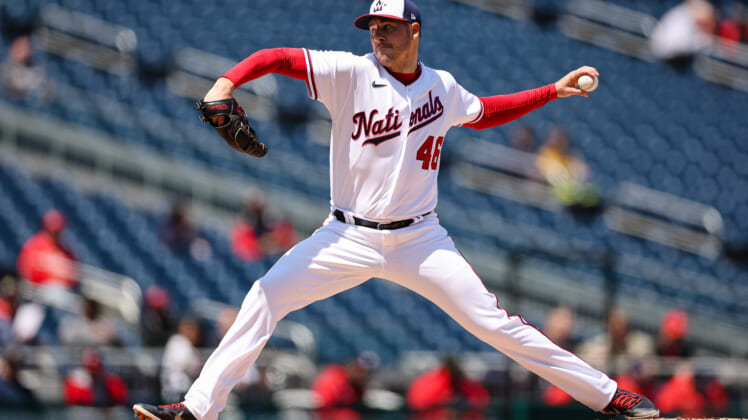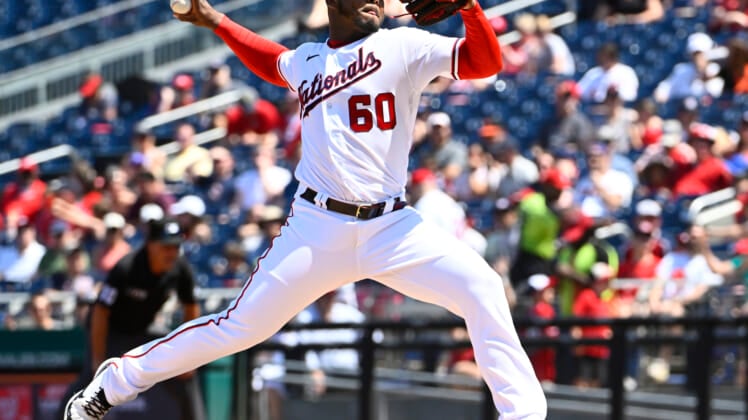
The Washington Nationals are in a dark place. Since winning the 2019 World Series, they’ve failed to make the playoffs and muster a mere .500 team. To boot, they blew up a third of their roster at last year’s MLB trade deadline, embracing a full-blown youth movement. In the present, they’re 6-15, which is good for 29th in MLB.
Like any rebuild, the Nationals have their fair share of compelling players. That talent will be rendered ineffective across the board, though, if their newfound pitching depth doesn’t live up to the hype.
Here’s why the progression of Washington’s young starting pitchers makes or breaks its rebuild.
Washington Nationals can’t rely on Patrick Corbin, Stephen Strasburg

Despite trading away household talents like Max Scherzer, Trea Turner and Kyle Schwarber, the Nationals had a chance — albeit remote — to be more of a retooling project than a rebuilding one. When healthy, they still had several premier/All-Star-caliber players in Juan Soto, Josh Bell, Patrick Corbin and Stephen Strasburg. They also had payroll flexibility. Those two prospects have vanished.
Outside of inking designated hitter Nelson Cruz to a hefty, short-term deal, the Nationals were quiet on the free agent market. On a more concerning note for their sake, a pair of rotation pillars are crumbling.
In 2019, Corbin pitched like an ace in a rotation where he was the number three starter. He got hitters to wave at his slider, posted strikeouts at a high rate and was arguably the best free agent pickup of the preceding offseason. Since 2019, Corbin has been quite possibly the worst consistent starting pitcher in the sport. He has been hit hard, struggled to provide length and entered his April 28 start against the Miami Marlins with a combined 5.81 ERA over his last 46 starts.
- Patrick Corbin stats (2021): 5.82 ERA, 1.47 WHIP and 143 strikeouts across 171.2 innings (31 starts)
At his best, Strasburg has been an elite, big-game pitcher. Unfortunately for the right-hander, injuries have gotten the best of him of late. Strasburg is yet to make a start this season as he continues to recover from thoracic outlet syndrome surgery. He has made a combined seven starts since 2020.
Objectively speaking, manager Dave Martinez can’t rely on Corbin and Strasburg to be the backbone of his rotation. Whatever Martinez gets from the two veteran arms is a bonus. Who is he supposed to rely on for such support?
Related: MLB playoffs: 2022 MLB postseason predictions, schedule and format
Washington Nationals have organizational pitching depth

Washington is deep in young arms at both the MLB and MiLB level. A pair of enticing arms, Josiah Gray and Joan Adon, are part of the team’s big-league rotation.
Gray has taken his lumps but also flashed a great deal of upside. He’s logging strikeouts at a high rate, getting better grip on his off-speed pitches and keeping the Nationals in games this season. Adon has five career MLB starts under his belt. The right-hander has been hit-and-miss but shows the potential to provide length and is still 23.
Washington has a handful of top pitching prospects who are yet to reach the big leagues. Those players include 2019 first-round draft pick Jackson Rutledge and 2020 draft picks Cade Cavalli (first round) and Cole Henry (second round). Meanwhile, Joe Ross had a respectable 2021 campaign prior to suffering a season-ending elbow injury, and Erick Fedde has had his moments.
- Josiah Gray stats (2022): 4.05 ERA, 1.45 WHIP and 28 strikeouts across 20.0 innings (four starts)
Realistically, the Nationals need two of these pitchers to become reputable forces with at least one more being a respectable, middle-of-the-rotation starter. There will inevitably be misses. Outside of catching depth (Keibert Ruiz, Riley Adams and Tres Barrera), starting pitching is the deepest part of Washington’s organization in the long run.
One could argue that young pitchers in general have to progress for the Nationals to prosper; they’ve been throwing young relievers/arms with minimal MLB experience like Mason Thompson, Kyle Finnegan and Tanner Rainey into pivotal situations over the last year.
Related: Cade Cavalli’s rough spring training outing does little to suggest he’s ready for the show
Starting pitching has to become the Washington Nationals’ identity
Washington’s offense is off to an anemic start, and a bevy of long-term questions exist on that front. Are any of Washington’s starting infielders, who are all 29 or older, part of the team’s future? Can Lane Thomas build on his brief 2021 success? Are Victor Robles and Carter Kieboom’s Washington tenures on the brink? What’s the deal with that Juan Soto extension?
This offense is talented enough to at least be a middle-of-the-pack unit in the short term, and they have some time to become a more well-rounded force. The great equalizer to any offensive shortcoming is stout starting pitching. That’s the Nationals’ way out of this rut.
There isn’t a World Series winner in the last decade or perennial playoff participant that hasn’t had a reliable rotation for the better part of recent memory. An MLB team can get around a lacking offensive attack or bullpen by having a top-tier rotation. Just three years ago, the Nationals had a lackluster bullpen, but their rotation was stellar enough to offset it, as they limited the pen’s workload.
Washington’s rebuild doesn’t have an identity. It has Soto, which is great and all, but he’s one player. They need an aspect of their ball club to lean on.
The Nationals’ long-term success hinges on the development of their young starting pitchers and that’s become more clear with each game that passes.
